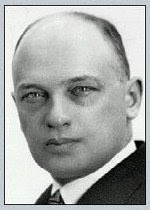Chess Column
 by Albert Frank
by Albert Frank
The four famous hypermodern chess founders are Breyer, Reti, Nimzowitch, and Tartakower.
Reti was both a mathematician and a chess player. He once explained that mathematics was of a purely speculative character, while the over the board struggle in chess, where he could force his opponent to acknowledge the truth of his chess ideas, was more alive. This is what makes him most interesting.
In his early years, 1907-1911, he was a good but not great player. It was in 1918 that he burst on to the international scene. In 1918, he won at Kaschau, with Vidmar, Breyer, Asztalos, Havasi and Mieses in that tournament. He shared 1st prize at Budapest in the same year, was 1st at Rotterdam, Amsterdam in 1919 and Vienna in 1920, and above all, he won 1st prize at the great international tournament of Gothenburg in 1920.
Reti then spent the time to write Die neun Ideen im Schachspiel. A year later, an English edition appeared called Modern Ideas In Chess, which all chess players own today.
In 1922 he returned to active international play and was equal 1st at Teplitz-Schonau; in 1923 he was twice 2nd at two important tournaments --- at Mahrisch-Ostrau and Vienna.
When 1924 came around, the great World Champion Jose Capablanca hadn't lost a single game in ten years!! In the great 1924 New York tournament, where Capablanca, Dr. Lasker (the eventual winner), and Dr. Alekhine took part. Reti won against Capablanca. It was the first game lost by Capablanca in 10 years!! Later in the tournament, totally shaken and obviously feeling mortal, Capablanca lost to the great Dr. Lasker.
After this tournament, Reti went to South America and set a World Blindfold Exhibition record of 29 games. He won 20 and lost only 2 (drawing 7). Reti was a great blindfold player, and so was Dr. Alekhine (whose record he broke that day).
Xavier (originally Savielly) Tartakower (1887-1956) Russian-born French chess player and writer, Polish champion (1935, 1937). He wrote some excellent chess books and he is known for some famous quotes about chess:
"There is really only one mistake in chess - underestimating your opponent."
"All chess players should have a hobby."
"Tactics is knowing what to do when there is something to do; strategy is knowing what to do when there is nothing to do."
"A chess game is divided into three stages: the first, when you hope you have the advantage, the second when you believe you have an advantage, and the third… when you know you're going to lose!"
The following game, won by Reti in 11 moves, is one of the shortest games ever played between Masters. (The shortest game ever played as this level was: 1. e4 c6 2. d4 d5 3. Nc3 dxe4 4. Nxe4 Nd7 5. Qe2 Ng8-f6 6. Nd6 mate!)
R. Reti - X. Tartakover, Vien 1910
1. e4 c6 2. d4 d5 3. Nc3 dxe4 4. Nxe4 Nf6 5. Qd3 e5 (a
dangerous maneuver: it will take two queen moves to
recover this pawn, while white will develop his pieces)
6. dxe5 Qa5+ 7. Bd2 Qxe5 8. O-O-O Nxe4??
A loosing mistake.
Tartakower is too greedy. He had to play
8…Be7, and try to survive. [See
diagram.]
9. Qd8+!! Kxd8 10. Bg5++ Kc7 11. Bd8 mate! …(if 10. Ke8 11. Rd8 mate).















No comments:
Post a Comment